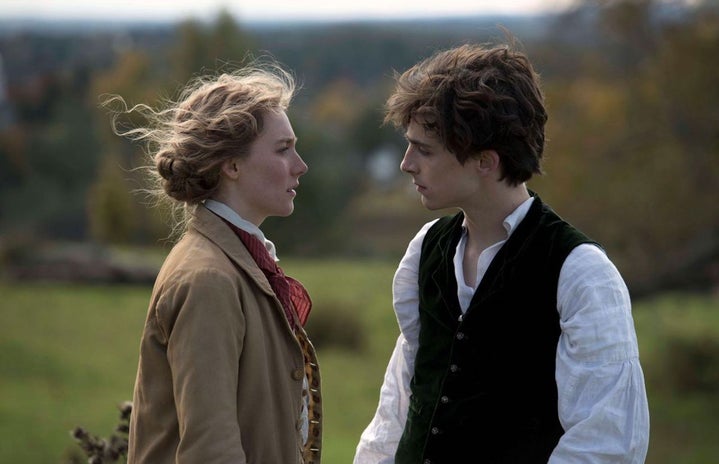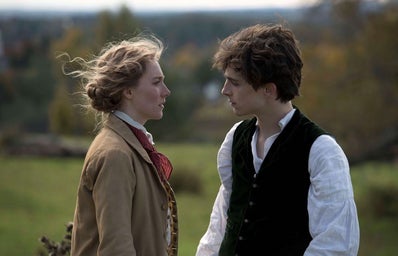Written in 1868 by Louisa May Alcott, Little Women has become the cornerstone of classic coming-of-age literature. With over seven film adaptations, this story has become beloved by many people, especially young girls and women. As International Women’s Day is just on the horizon, let’s revisit the movie that stands out the most, Greta Gerwig’s Little Women.
Released in 2019 and with a star-studded cast, Greta Gerwig’s adaptation won an Oscar, a few BAFTAs and was nominated in several categories for outstanding work. It’s easy to understand why the movie was such a box office hit with big names like Emma Watson, Timothee Chalamet, Meryl Streep and Saoirse Ronan filling some of the lead roles. But there’s more to this movie than just its talented stars.
Little Women tells the story of the four March sisters, Meg, Amy, Beth and Jo, growing up in Concord, Massachusetts amidst the 19th century. Each girl is trying to navigate her way in a world that tells them constantly they can’t get anywhere without a man. Gerwig does a fantastic job of bringing as much attention to the rest of the March sister’s stories as Jo’s (the main character). Each path is unique and equally celebrated in the movie, which is exactly what young girls and women should be exposed to.
Meg – A Mother and Wife
Meg March, the eldest daughter, is seen from the beginning of the movie actively pushing herself out into the world. She attends balls and social gatherings, entertaining various people of higher social class in order to find herself a husband. Though Jo often tells her she doesn’t need a husband and would much rather be happy with a life on the stage, Meg stays her course. She falls in love with their neighbour’s tutor, Mr. Brooke, despite him not being a wealthy man and having two children. Though Meg finds it difficult not to have what she wants, often comparing herself to other women in town whose husbands’ earnings allow them to enjoy all life’s pleasures, she would not trade her life for anything.
On her wedding day, Meg tells Jo that “just because my dreams are different from yours does not make them unimportant.” This quote encompasses the film’s entire message. Meg is a symbol for any woman out there who is content with the “traditional” path of domesticity and motherhood. Meg teaches everyone that there is absolutely nothing shameful about wanting a life like that.
Amy – A Realist with Dreams For Herself
Amy March, the youngest, is the naive one out of the March sisters at the beginning of the film. Always trying to be included, whining when she isn’t, and not always taking the high road when she’s upset; Amy is a stand-out character. But, as she grows she becomes more than just the tag-along sister who brags about her perfectly small feet. Amy goes to France to study painting and to socialize herself into a marriage with a wealthy man. She wants to refine herself into a talented artist, saying she “wants to be great or nothing.” This goal-driven attitude is also reflected in how she approaches love and marriage. Amy’s focus on finding herself a rich man is frowned upon by her close friend, Laurie, who disagrees that she should marry for love. Amy explains that because she is a woman, she has no way of making her own money. Even if she did, it would not belong to her but instead her husband, as would any property she owned or any children she bore. Amy concludes by saying, “so don’t sit there and tell me that marriage isn’t an economic proposition because it is. Maybe not for you but it most certainly is for me.”
Amy is the kind of strong-headed woman who realizes the implications of her gender and how it puts her at a disadvantage. Though she is different from her sister––Meg, who, above all wants to be a wife and mother––Amy understands that wealth is the only way she can have a good life. She understands who she is, exploring her interests and never forgetting reality. Amy learns how to embrace her situation rather than fight as hard as she can against it, ultimately marrying well than marrying for love.
Beth – A Beacon of Love
Beth March, the middle child, is the glue that keeps all the sisters together. She is shy and spends a lot of her time playing piano in the living room. Beth’s gentle nature seeps into her sisters’ personalities whenever there are any disagreements. Beth chooses the path of grounding those around her and offering kindness whenever possible. Though this kindness puts her in positions of peril, her spirit never falters from that of gratitude for what she has and the love for her family. She is the sister that the rest look up to and “was the best of us,” as Jo says, near the end of the film.
Jo – A Fiercely Independent Soul
Jo March, the main character and most interesting personality of all, is what we’d call “not like other girls.” She makes a conscious effort not to be entertained by beauty, glamour and hopeless romance. Jo’s dreams of becoming a published author are obvious in every aspect of the film as she writes plays for her and her sisters to perform, sells short stories to the local newspaper for cash and spends the second part of the film working on a grand novel on her and her sisters’ stories. Jo refuses to ever get married, wanting to make her own way in the world without a husband, and declares herself as the master of her own fate. She often belittles her other sisters’ dreams of getting married and exclaims that she is disappointed in being a girl.
Jo declares her disdain for how women are viewed, as beings only fit for love despite possessing minds, souls and creativity; but eventually shows that she wants to love and be loved. Despite rejecting the traditional aspects of being a woman her whole life, Jo learns that she can be her independent self whilst wanting to be with someone.
Different paths of equal value
Gerwig’s Little Women gives us a beautiful message about womanhood. Each of the March sisters carved a different path for themselves, and the film does an excellent job of portraying them as equally important. Oftentimes, misogyny makes women believe that liking feminine things or desiring a “traditional” life for themselves is bad. This movie tells us quite the opposite. Meg and Amy show us that you should not be ashamed of what you want, regardless of whether it is deemed feminine. There is nothing wrong with being interested in dresses, dainty activities and marriage.
On the other hand, Jo, being a self-proclaimed, independent woman, allowed herself to work hard for her pursuits and her family. Jo rejected the societal norms that were thrust upon her and was content believing that men were not a necessity to her happiness or success. She accomplished many things in her life but eventually realized that she also wanted a partner for herself. This teaches us that being an independent woman doesn’t mean you can’t be in a romantic relationship, and it doesn’t make you any less self-sufficient.
Finally, being your family’s keeper and focusing on spreading kindness is just as meaningful and necessary. Beth teaches us that vulnerability and gentleness can be powerful as she single-handedly kept the family together over the course of several years and invited other characters who needed that sense of unity. She was each of her sisters’ moral compass, keeping them in check and supporting them wherever their endeavours took over them. Although she never found her one true love, it seems Beth never felt she needed it, but not out of forceful energy–– rather satisfied with what she had.
Little Women is a movie everyone should watch. Not just for its simple entertainment value and a glimpse at Emma Watson, but for its lessons on womanhood and what feminism looks like. So, this March 8 check out Little Women on Netflix, and appreciate all there is to be a woman, whether you identify as one or not!


